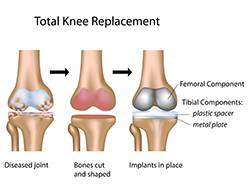Total Knee Joint Replacement: The Basics You Need to Know
Medically Reviewed by Patrick K. Denton, MD

One-third of Americans age 65+ will suffer from Osteoarthritis, commonly caused by normal “wear and tear.” Most often, it significantly affects your hips and knees, the body’s weight bearing joints. Since the first total knee joint replacement in 1968, along with 1) better techniques, 2) longer-lasting materials, and 3) mature adults as young as 50 seeking to stay active longer, this procedure has become increasingly common. Some 700,000 knee replacements are performed annually in this country. And it may climb to more than 3 million a year by 2030.
WHY YOU MAY NEED ONE
“In addition to osteoarthritis, there are several other reasons a person may need the total joint replacement,” says Pat Denton, MD. “Rheumatoid arthritis is chronic inflammation that can damage the cartilage, which lubricates the joint. A serious injury, such as a fracture or torn ligaments, can also lead to a knee replacement. In all these cases, movement and function is limited and often painful.”
UNDERSTANDING THE KNEE
“Knee” describes the point, where the upper part of your leg (the femur) meets the lower part of your leg (the tibia). Cartilage helps cushion the point where the two meet. The synovial membrane releases fluid that further lubricates the cartilage.
When arthritis or injury destroys the cartilage and then the bone, a joint replacement is needed.
THE OPERATION
The actual surgery takes 1 to 1.5 hours. During the procedure, your Orthopedic Specialist and their surgical team will:
- Remove the arthritic cartilage and the bone underneath it.
- Remove the top of the tibia and drill a hole for placing the metal plate.
- Position the metal plate on top of the tibia
- Position the metal implant on the bottom of the femur.
- Place a plastic spacer between the two metal components so they work smoothly.
- Reshape the kneecap to fit the new components.
AFTER YOUR SURGERY
Your Orthopedic team will work to get you up and walking the same day as the surgery and out of the hospital as soon as possible. Most patients only stay in the hospital 1 or 2 days.
Pain Management will help you recover faster with minimum pain. Follow your Orthopedic Specialist’s directions.
Physical therapy strengthens your leg muscles. You’ll quickly progress from using a walker, to using a cane and to walking without aid.
WHAT YOU NEED TO KNOW
- You may feel or hear a “click” when walking or bending your knee. Don’t worry. This is normal and generally decreases over time.
- Kneeling may be uncomfortable, but it won’t hurt you.
- The metal in your knee can set off the airport security detectors. Tell the TSA agent about your knee before the scan.
You may also find these articles helpful:
Prepping for Your Total Joint Replacement
Are You Too Old for Joint Replacement?
Before and After Joint Replacement: 9 Things to Know
Find an Orthopedic Specialist near you.
Sources include: McLeod Health, US Centers for Disease Control & Prevention, Arthritis Foundation, American Academy of Orthopaedic Surgeons, National Institutes of Health, American Bone & Joint Journal
-
McLEOD REGIONAL MEDICAL CENTER FLORENCE
843-777-2000 -
McLEOD DARLINGTON
843-777-1100 -
McLEOD DILLON
843-774-4111 -
McLEOD LORIS
843-716-7000 -
McLEOD SEACOAST
843-390-8100 -
McLEOD CHERAW
843-537-7881 -
McLEOD CLARENDON
803-433-3000



-
McLEOD REGIONAL MEDICAL CENTER FLORENCE
843-777-2000 -
McLEOD DARLINGTON
843-777-1100 -
McLEOD DILLON
843-774-4111 -
McLEOD LORIS
843-716-7000 -
McLEOD SEACOAST
843-390-8100 -
McLEOD CHERAW
843-537-7881 -
McLEOD CLARENDON
803-433-3000
 Find a Doctor
Find a Doctor  Locations
Locations  Services
Services